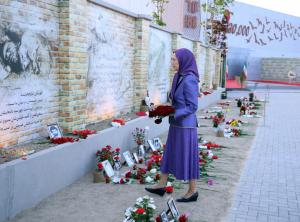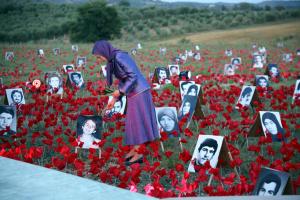(Video) Iran: This is a Test for the International Community to Stand with the Iranian People or the Genocidal Regime
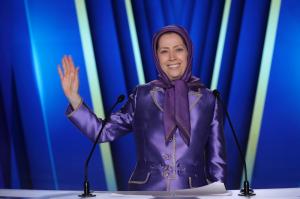
(PMOI / MEK Iran) and (NCRI): Maryam Rajavi: This is a litmus test of whether the international community will engage and deal with this genocidal regime or stand with the Iranian people.
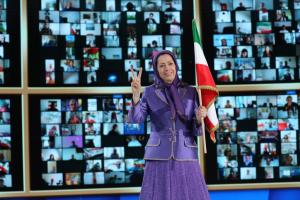
(PMOI / MEK Iran) and (NCRI): Maryam Rajavi: Raisi must be prosecuted for genocide and crimes against humanity during the 1988 massacre and the massacres before and after that.
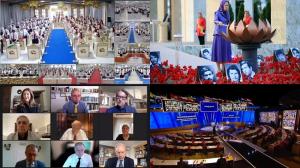
(PMOI / MEK Iran) and (NCRI): 3rd Day of the Free Iran World Summit; Global Support for the Iranian People’s Uprising & the Democratic Alternative.
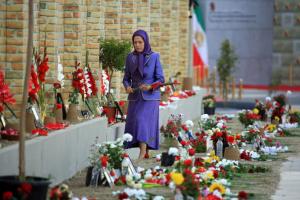
(PMOI / MEK Iran)&(NCRI): Before addressing the Summit, Mrs. Rajavi visited the Khavaran Memorial, which was built in Ashraf 3, Albania, to honor the memory of the 30,000 martyred political prisoners during the summer of 1988 massacre, and paid tribute to those martyrs.
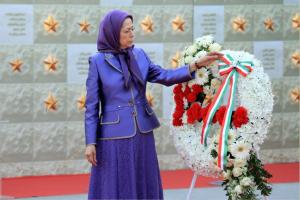
(PMOI / MEK Iran) and (NCRI): It is here that we remember the great Mojahed, the late author Hamid Assadian, who throughout these three decades tried to expose the executioners and to keep alive the memory of the victims.
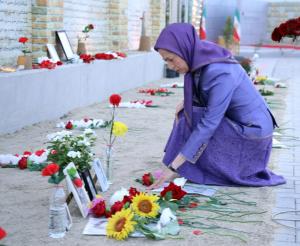
(PMOI / MEK Iran) and (NCRI): These martyrs were executed based on Khomeini's fatwa and by Raisi and other ruling criminals because they refused to repent and remained steadfast in their beliefs and commitment to freedom.
Maryam Rajavi: Raisi must be prosecuted for genocide and crimes against humanity during the 1988 massacre and the massacres before and after that.
The extracted text of Maryam Rajavi’s Speech appears below:
Dear friends,
In this summit, which simultaneously commemorates the victims of the 1988 massacre, the presence of great and esteemed friends of the Iranian Resistance is a source of support for our people, especially for the victims’ families.
At a time when their cries of innocence were silenced by the label of terrorism, you and the voice of your conscience broke the deafening silence.
You are pioneers of a brilliant policy on the Iranian issue, which points to the right side of history.
You are the ones who repeatedly said that seeking out moderates in this savage regime is a mirage and an illusion. And now that Khamenei has made a mass murderer his president, everyone is acknowledging that you were right. Yes, you spoke the truth. In time, the validity of your positions on the People’s Mojahedin, the Iranian Resistance, and the democratic alternative will be proven. I applaud and praise all of you.
The regime represents only 1.5% of people
Dear friends,
When it comes to the Iranian people’s relationship with the regime, the appointment of Ebrahim Raisi, the henchman of the 1988 massacre, to the presidency of the mullahs’ religious dictatorship is a reflection of the era of its overthrow.
In terms of history, a regime that has laid its foundations in a sea of blood of the People’s Mojahedin has personified the ultimate product of its 42-year history in a murderous henchman.
And in political terms, it is the end for illusions of moderation within the regime. It marks the failure of Western governments’ policy of complacency toward religious fascism.
Now, they have handed over the executive branch to a mass murderer, the judiciary to a professional assassin, and the legislative branch to a club wielder who has openly declared: “I am one of the club wielders, and I am proud to have wielded the stick against Massoud Rajavi (the Leader of the Iranian Resistance) since 1979.”
Truly, he is the embodiment of obscenity and wickedness.
Indeed, if the religious dictatorship was not on the verge of demise, why would it need to put a band of cannibals in charge of the system?
At the end of the election charade (in June), based on the reports from more than 1,200 of its journalists and reporters in 400 cities of Iran and more than 3,500 video clips, the People’s Mojahedin Organization of Iran (PMOI/MEK)1 announced that the turnout was less than 10%.
But today, I will deliberately examine the results announced by the mullahs’ Ministry of Interior:
In Shiraz, which Massoud Rajavi has called the capital of the 2019 uprising, some 70 percent of voters refused to vote.
In Tehran, with 9 million residents, 80% of voters did not participate.
In Tehran Province, which includes the rebellious cities of Shahriyar, Qal’eh Hassan Khan, and Islamshahr, 70% refused to vote.
The City Council elections were even more disastrous. In some metropolitans, void ballots came in first.
The voter turnout in Tehran was 14% and in Tabriz, only 1.5%. Yes, this regime represents only 1.5 percent of the population.
The whole story is that the objective conditions for the regime’s overthrow are in place.
As far as the Iranian people are concerned, they are, as always, redoubling their resolve to overthrow the religious dictatorship in the face of the regime’s new repressive and aggressive posture.
Dealing with murderer Raisi is the international community’s litmus test
As far as the international community is concerned, this is a test of whether it will engage and deal with this genocidal regime or whether it will stand with the Iranian people.
We say to the world community, especially to Western governments, that Mullah Raisi is a criminal guilty of genocide and crimes against humanity in 1988.
He is guilty because as one of the regime’s highest Judiciary officials during the last 40 years, he played a decisive role in the execution and murder of the Iranian people’s children.
He is guilty because he is one of the leaders of a regime that killed 1,500 youths during the November 2019 uprising, a figure that researchers say is actually three times higher.
Raisi is guilty because even today he defends all his past crimes and insists on continuing them.
As Amnesty International’s Secretary-General said, “That Ebrahim Raisi has risen to the presidency instead of being investigated for the crimes against humanity of murder, enforced disappearance, and torture is a grim reminder that impunity reigns supreme in Iran.”
On behalf of the Iranian people and their Resistance, I emphasize that the United Nations and the international community should recognize the 1988 massacre in Iran as genocide and a crime against humanity.
I call on the UN Security Council to take action to hold the leaders of the mullahs’ regime, especially Ali Khamenei, Raisi, and Ejeii, accountable for committing genocide and crimes against humanity. The United Nations must not allow Raisi to participate in the next session of the General Assembly. This would be an unforgivable insult to the people of all countries who send their representatives to the United Nations.
We will fulfill these demands at all costs. It was this Resistance that one day forced Khomeini to drink the poison chalice of ceasefire in the Iran-Iraq war. It was this Resistance that one day caught Ali Khamenei by exposing the regime’s nuclear program. And it will be this Resistance that will one day pour the poison chalice of human rights down the throat of this religious dictatorship. This will certainly become reality.
The question is adhering to or renouncing one’s positions
Dear friends,
The 1988 massacre was one of the darkest moments in Iran’s contemporary history. In the words of Baroness Boothroyd, the former speaker of the UK House of Lords, it is the greatest crime against humanity since the Second World War, which has gone unpunished.
At this point, let’s go back 33 years. Let us imagine the scene of questions and answers, each of which determined the fate and life of a prisoner.
In small rooms in the prisons of Evin, Gohardasht, Mashhad, Isfahan, Shiraz, Tabriz, Ahvaz, and dozens of other cities, prisoners were condemned to death without having committed any crime.
On the one side sat the mullahs and the executioners of the death commissions. One of the most savage and cruel figures among these demons was Ebrahim Raisi.
On the other side is a lone prisoner in the dock. He/she has not committed any crimes. In the eyes of the prosecutors, however, the prisoner represents the “crime” of a movement. The prisoner has no lawyer but must defend the rights of an oppressed nation. There are no witnesses to this unfair trial. He/she is the only witness.
Most astonishingly, the questions are not about the commission of any crime, but inquire about which side of history is the prisoner on?
Here are the questions:
Are you prepared to denounce the PMOI and its leadership?
Are you willing to join the armed forces of the Islamic Republic and fight against the PMOI?
Are you willing to provide information on former comrades… and “co-operate” with intelligence officials?
Are you willing to participate in firing squads?
Are you willing to hang a monafeq (a pejorative epithet for members and supporters of the PMOI)?
Are you prepared to express “repentance” about your political opinions and activities?
Are you prepared to declare loyalty to the Islamic Republic (through written and/or televised “confessions”)?
Are you willing to walk through an active minefield to assist the army of the Islamic Republic?
I quoted these appalling questions, which were posed to the victims of the 1988 massacre, from Amnesty International’s investigative report. (1)
The subject of these questions was not spurious allegations like participation in prison revolts or misconduct during captivity. The subject of these questions was not even the prisoners’ connection with the PMOI’s military operation (in July 1988).
Khomeini had already determined the core issue in two successive religious decrees.
His decree specifically concerns the PMOI. The decree says that “those who persist in their allegiance to the PMOI in prisons across the country are at war with God and are sentenced to death.”
At the time, Khomeini’s Chief Justice asked him whether this sentence applied to those PMOI members who had been sentenced to death and who refused to change their position, or whether it also applies to those PMOI members who were merely serving their prison term but still adhered to their beliefs.
Khomeini’s clear and concise answer was: “Anyone, at any stage, is sentenced to death if he maintains his positions as a hypocrite (i.e. People’s Mojahedin).”
The distillation of the two decrees of Khomeini and the short version of the questions in these show trials are: Do you stand by your position as a People’s Mojahedin?
The Mojahedin answered yes to this question and accepted to be executed.
On the 30th anniversary of the 1988 massacre, Amnesty International wrote in its report: “Across the country, the victims were primarily supporters of the PMOI, both men and women. In Tehran province, hundreds of men affiliated with leftist opposition groups were also executed.”
Amnesty International added: “In Kurdistan and West Azerbaijan provinces, the waves of enforced disappearances and extrajudicial killings also targeted hundreds of prisoners affiliated with the Kurdish opposition groups Komala and the Kurdish Democratic Party of Iran (KDPI).”
Thus, the massacre of the Mojahedin-e Khalq was carried out throughout the country. At the same time, the regime’s murderous machinery re-arrested many former prisoners or persons suspected of supporting the PMOI and sent them to execution chambers.
All of them faced the same question that determined their fate: Do you maintain your positions on the PMOI?
Since that day and until today, this question has not ceased to confront us. It is the question of our time. It is the question of being faithful to one’s positions or not. But the PMOI, as the Quran says, did not abandon its position.
We have answered yes to this question and we will answer yes again and again. We will never abandon the resistance to free the Iranian people and to overthrow the regime.
A persevering generation for Iran’s liberation
My dear compatriots,
In the summer of 1988, after the mass murderer Raisi and his accomplices sentenced them to death, the PMOI heroes walked through the corridors leading to the execution chamber while shouting “Down with Khomeini! Long live freedom! Long live Massoud Rajavi!”
This is freedom’s blood-drenched anthem and the song of perseverance of a generation determined to write a new destiny for the Iranian people and history.
One of these heroines was the U.S.-educated Zohreh Ain-ol-Yaqine, then head of Isfahan Teachers’ Association. She wrote in a letter from Evin Prison, “I thought about everything that has happened so far and went through everything in my mind. I think that everyone sings a song during his/her lifetime and dies. But what remains, in the end, is a pure and untainted form of humanity that lives on.”
Another one of these heroes was Rahim Rajli. He wrote in his will, “I love life with all its beauties; I love everything that blooms (…) I do not wish to die. But for the sake of life, I embrace the crimson death with open arms. And if I have the honor of falling as a martyr on this path, send my greetings to Massoud [Rajavi], and tell him that Rahim kept his promise and he has become a Rajavi.”
This is the blood-drenched commitment of all generations of the PMOI, as Maryam Golzadeh-Ghafouri wrote: “As long as there is even a single Mojahed, he/she will not let the revolution be stopped. The People’s Mojahedin will sacrifice everything he/she has in order to free Iran and the Iranian people from captivity.”
Massoud Rajavi’s Campaign for Justice
Dear friends,
The massacre of the People’s Mojahedin had another important aspect, which comprised of a vast effort to cover up this crime. But from the very first weeks after the start of the massacre, Massoud Rajavi issued a wave of statements, revelations, and calls for justice in Iran and abroad.
As early as August and September 1988, in multiple letters and telegrams to the UN Secretary-General, he made numerous revelations about the massacre. Among other things, he revealed the contents of Khomeini’s two main religious decrees. On August 25, 1988, he wrote to the UN Secretary-General that Khomeini had issued a decree in his own handwriting ordering the execution of PMOI political prisoners.
In December of the same year, in an interview with Voice of Mojahed Radio, Massoud Rajavi explained that “On two occasions, Khomeini personally issued the executive orders to the head of the Judiciary Moussavi-Ardebili, stressing, among other things, that in the case of the Mojahedin (…) anyone who insists on his/her positions (…) is sentenced to death and must be executed immediately.”(2) This was twelve years before Ayatollah Montazeri (Khomeini’s ousted heir apparent) published the text of this decree in his book.
In my view, what Massoud (Rajavi) has done goes far beyond the relentless campaign of the last four decades. By safeguarding the very values and principles cherished by the victims of the massacre through seeking justice for them, he has defended their dignity and honor to the greatest possible extent. This call-for-justice campaign will continue until achieving victory for the cause of these martyrs, namely, the liberation of the Iranian people.
It is very noteworthy that in the April 1989 letter dismissing Mr. Montazeri, which was about 700 words long, Khomeini referred to the PMOI nine times, accusing Mr. Montazeri of assisting the Mojahedin in their attempts to find out the number of execution victims through him. More importantly, he said that after him, Ayatollah Montazeri would hand over the country to the liberals and through them to the PMOI. And because of this, he explains, Montazeri lost the competence and legitimacy to lead the regime in the future.
As attested to by the events of the past 33 years, the revelations about the 1988 massacre are the outcome of a relentless campaign seeking justice. The Iranian people’s Resistance, the families of martyrs, political prisoners, torture victims, and thousands of survivors of the 1988 massacre who are based in Ashraf-3, are the ones responsible for this campaign...
We have said and we continue to say yes to the great question of our time. We will overthrow the clerical regime by relying on the Iranian people and the great Army of Freedom.
Glory to the martyrs!
Long live the Iranian people!
Shahin Gobadi
NCRI
+33 6 50 11 98 48
email us here
Visit us on social media:
Facebook
Twitter
WATCH NOW: Maryam Rajavi addresses first day of Free Iran World Summit at http://www.youtube.com/watch?v=OINguVYzv2A

1 https://english.mojahedin.org/i/primer-the-history-the-peoples-mojahedin-organization-iran
2 https://www.ncr-iran.org/en/about-ncri/alternative/
3 https://www.maryam-rajavi.com/en/

